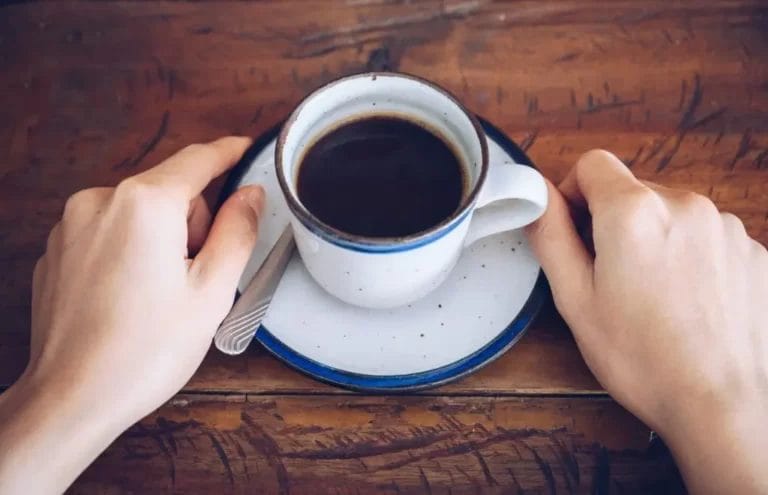Many coffee lovers wish to switch to black coffee for the added benefits, bold coffee flavor, and caffeine kick, but it’s tough to make. A lot of consideration goes into leaving the color and flavorful world of coffee to settle for a black liquid of bitterness.
But it’s not all too bad. In fact, black coffee offers you more good than you think. But that still leaves the entire process of switching to black coffee, and we’re here to provide helpful tips on how to switch to black coffee without pressuring yourself.

Before doing so, let’s look at the benefits we are trying to achieve.
Why Switching To Black Coffee Is A Good Decision
The very first reason you need to switch to black coffee right away is sugar. Regular coffee needs added sugar, which works like a slow poison for your body.
Take the sugar out of your diet, take the healthcare bills out of your monthly expense. It’s that easy.
There’s also a multitude of black coffee benefits that you can enjoy, such as:
- It helps prevent Alzheimer’s
- It helps reduce the risk of cancer
- It improves mental state and mood
- It helps you manage your diabetes
- It enables you to Manage your obesity
- It can prevent Perkinson’s disease
10 Tips For Switching To Black Coffee
Made up your mind already? Guess the benefits were too good to pass up 😉.
Let’s hope our tips help your transition to be a bit easier.
Tip #1: Try Different Coffee Types
The coffee world is too vast for you to linger on to just one type of coffee. Different kinds of blends and brews can give you a unique feel that you can experience only by drinking them.

If you are trying to switch to black coffee, you should first try to taste coffee types that are as close to black coffee as possible without compromising the comfort of your taste palate.
Tip #2: Change Your Brew Method
As a fellow coffeenomie, you already know that different brewing methods change the taste of your coffee a lot. Each brew method extracts the flavor from the coffee in another way from the previous one.
The key is to find a brew method that slowly gets you closer to a more black coffee-type drink till you are ready to switch to black coffee.
If you are indecisive about it all, you can always visit your nearest coffee shop to find out your preference. The barista there will always be happy to help you put a name on the flavor you can’t quite describe.
Tip #3: Find some coffee that features elements you enjoy in your coffee additives
Now that you’ve identified your choice, take note of the additives and the features you enjoy in the said brew. Your idea is to slowly crawl towards readymade coffee drinks that use fewer additives than your regular dosage.
Tip #4: Measure what you are putting into your coffee
In the case of manual brewing, measure everything you use in your every brew, and keep detailed notes. And yes, that includes the additives as well. This way, you can keep your brews consistent and determine the exact amount of your cream and sugar consumption.
You can also use the data to compare other drinks and determine the next point to decrease your sweetness count. This brings us to our next trip.
Tip #5: Gradually Reduce Your Use Of Additives
Rome wasn’t built in a day, and neither will be your black coffee habit. But this tip can be a good start to break the bad habits of sugar consumption.
First, you need to figure out the amount of sugar, cream, or chocolate syrup you use in your coffee per day on average. Once you’ve done the math, start using lesser amounts regularly. But, there’s a trick to it.

Decreasing the amount each day will make the difference too obvious to your taste palates, and you’ll immediately shudder and go back to the usual.
Take it down a notch; keep using the same amount for a week. Once you’re used to it, decrease the amount by a bit once again. This is an endurance test, but it’s effective.
Another part of this tip is to switch your buying habit to buy fewer amounts of cream and sugar for coffee.
Are you a coffee lover but worried of sugar?
Learn from our another piece on how to sweeten coffee without sugar.
Tip #6:Taste Your Coffee Before Adding Anything
If you’re already used to a meager amount of sugar and cream, this should get you a step further.
Brew your coffee, but don’t add anything at all. Take a deep sip and try to taste everything you can feel on your tongue. Try to analyze the textures you can feel on your palates and slowly build a resistance to them.
For a more amplified taste of black coffee, set aside a small amount of coffee to let it cool down to room temperature. With an actual temperature difference, the different flavors like berries of chocolate are more pronounced, making your research easier.
Tip #7: Buy Fresh Coffee
A large amount of coffee available in the market is already stale. Coffee doesn’t exactly “go bad” in the traditional sense, but it does lose its flavor integrity overtime via a chemical process. But why is this important?
When a batch of coffee loses its original flavor, it starts tasting more like stale, spoiled food or milk that’s gone bad. This phenomenon forces people to mix in sugar, milk, etc., to make their batches of coffee drinkable.
If you’re trying to stick to black coffee, buy fresh coffee, so you don’t have to force yourself to chug down radioactive waste just for the sake of your health.
Tip #8: Try Light Roasts
When drinking light roast coffee, you don’t have to deal with the bitterness as much as “traditional” black coffee beans.
Lighter roasts are easier on the tongue and can ease you into drinking black coffee with less bitterness and a softer yet diverse flavor that can satisfy your flavor profile craving.
Tip #9: Change Your Mug
Here’s a little mind trick for getting into the black coffee lovers club cause I’m sure by this point you are thoroughly motivated to get to it anyhow.

A study shows that the color of your mug affects how you feel about your coffee and how it tastes in your mouth. Example: Drinking coffee in a white mug will make you feel like you are drinking bitter coffee, while the same coffee will taste different in a transparent mug.
If you feel like your black coffee is too bitter, try putting it in a different cup/ mug, and take in the taste.
Tip #10: Go Cold Turkey
If you aren’t the type who can take a lot of time to get to it, just do a master reset on your taste buds and go cold turkey to cleanse your palates of the coffee flavor you are used to.
Once it’s been a while (a month at most), go back and drink a cup of black coffee. It’ll either piss you off right away, or you’ll be so amazed by the beautiful chocolate note you’ll wonder how dumb you were to not start drinking black coffee sooner.
But hey, it’s worth a try, right?
5 Alternatives To Black Coffee To Ease You Into The Flavor
Let’s say you want to ease yourself into black coffee slowly instead of switching right away. In that case, you can try out an alternative caffeinated beverage that gives you a similar taste without making it a painfully bitter experience.
Alternative #1: Japanese Cold Brew
Best made with lighter roasts, Japanese cold brew tastes like an iced drink. It’s a good start for anyone trying to switch to black coffee or give the black coffee taste a try with a better experience.
Alternative #2: Chicory Coffee
Chicory roots can be roasted like coffee beans and made into a coffee-like beverage. Chicory coffee tastes like black coffee, but it’s caffeine-free and very easy to prepare. The brown color may not be as convincing, but it’s a good start.
Alternative #3: Yerba Mate
Yerba Mate is a herbal tea that tastes like smokey, bitter coffee. It’s an acquired taste, but the natural caffeine amounts will make you feel right at home in no time.
Alternative #4: Chai Tea
It’s a black tea blended with strong herbs like cinnamon powder. The color of the drink and the robust flavor of the cinnamon extract can give you a similar feel to black coffee with a comforting smell.
Alternative #5: Kombucha
This may sound a bit icky, but kombucha results from the fermentation of black tea with bacteria, yeast, and sugar. The bacteria and yeast created from this process are collectively referred to as “Scooby.”

You can risk contamination from pathogens if you try to make it at home, but you can buy readymade kombucha for a distinct flavor.
Had fun reading? Learn more alternative stuffs from our alternatives to french press article.
Bottom Line
Switching to black coffee can be time-consuming, and your patience can run thin very fast. But trust us when we say that it’s worth it. Perseverance is the key, and we wish you all the best.
Cheers!
FAQs
Black coffee is the purest form of coffee. It’s extracted caffeine in hot water with no additives like sugar or cream.
Black coffee helps you cut down on sugar from your diet. The number of health benefits of drinking black coffee outweighs the discomfort of the bitter taste.
It’s a matter of practice and building a habit. If you slowly get yourself used to the bitterness of coffee, you can start enjoying black coffee too.
Black coffee is a straight mix of extracted caffeine from coffee beans by the hot water in contact. Without any cream or sugar in the mix, the natural bitterness in coffee is the first flavor anyone can get, making black coffee bitter.
Black coffee has zero unnecessary calories, with only 2 calories per cup.

